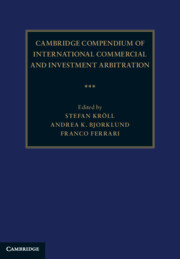Book contents
- Cambridge Compendium of International Commercial and Investment Arbitration
- Cambridge Compendium of International Commercial and Investment Arbitration
- Copyright page
- Contents
- Figures
- Tables
- Contributors
- Preface
- Part I Foundations
- Part II Public Law Questions Relating to Arbitration
- Part III Stakeholders in Arbitration
- Part IV Applicable Law
- Part V Jurisdiction of the Arbitrator
- Part VI The Arbitral Tribunal
- Part VII Procedural Questions in Arbitration
- 36 Implicit Consent and Unanticipated Risk in Class, Mass, and Collective Arbitration
- 37 The Principle of Equal Treatment in International Arbitration
- 38 Joinder of Third Parties
- 39 Evidentiary Issues in International Arbitration
- 40 Provisional Measures by Arbitrators and Emergency Arbitrators
- 41 Setting the Language (or Languages) of Arbitration – and the Impact of Language-Related Imperfections in Post-Award Proceedings
- Part VIII Role of State Courts in Arbitration
- Part IX Awards
- Part X Post-Award Issues
- Part XI Legal Concepts
- Part XII Areas of Concern
- Part XIII Arbitration and Related Fields
- Part XIV EU Law and Arbitration
41 - Setting the Language (or Languages) of Arbitration – and the Impact of Language-Related Imperfections in Post-Award Proceedings
from Part VII - Procedural Questions in Arbitration
Published online by Cambridge University Press: 18 February 2023
- Cambridge Compendium of International Commercial and Investment Arbitration
- Cambridge Compendium of International Commercial and Investment Arbitration
- Copyright page
- Contents
- Figures
- Tables
- Contributors
- Preface
- Part I Foundations
- Part II Public Law Questions Relating to Arbitration
- Part III Stakeholders in Arbitration
- Part IV Applicable Law
- Part V Jurisdiction of the Arbitrator
- Part VI The Arbitral Tribunal
- Part VII Procedural Questions in Arbitration
- 36 Implicit Consent and Unanticipated Risk in Class, Mass, and Collective Arbitration
- 37 The Principle of Equal Treatment in International Arbitration
- 38 Joinder of Third Parties
- 39 Evidentiary Issues in International Arbitration
- 40 Provisional Measures by Arbitrators and Emergency Arbitrators
- 41 Setting the Language (or Languages) of Arbitration – and the Impact of Language-Related Imperfections in Post-Award Proceedings
- Part VIII Role of State Courts in Arbitration
- Part IX Awards
- Part X Post-Award Issues
- Part XI Legal Concepts
- Part XII Areas of Concern
- Part XIII Arbitration and Related Fields
- Part XIV EU Law and Arbitration
Summary
Language issues have gained a complex and important role in international commercial arbitration. Questions have emerged pertaining to setting the language of arbitration, communication during the arbitral proceedings, and control of arbitral awards. If the parties fail to agree on the language (or languages) of arbitration, and no default language is offered, the actors are facing the question of the “initial language”. Cohabitation of more languages is another relevant problem-pattern - which gained specific weight in ICSID proceedings. Closely related languages give rise to some specific questions. Furthermore, at a time when international contracts are frequently drafted in a language other than the mother tongue of the parties, the question emerges whether the anchor language (the hidden original) may gain any relevance during the scrutiny aiming to discover the true intentions of the parties.
During the process of court control, language issues are also gaining special relevance. Language-based post-award challenges are typically sheltered under the grounds articulated in Article V(1)(b) and Article V(1)(d) of the New York Convention. The focus is usually on a failure (or alleged failure) to follow the language(s) set. Added important dimensions are being shaped through the argument of waiver, and through the issue of relevance.
- Type
- Chapter
- Information
- Publisher: Cambridge University PressPrint publication year: 2023

